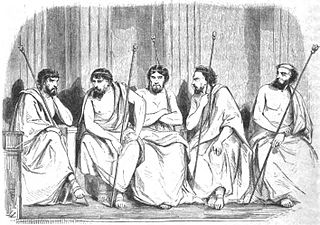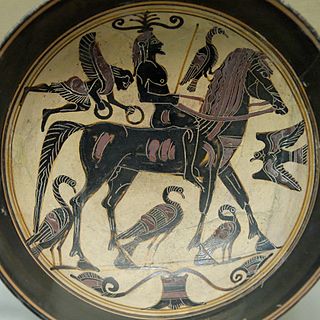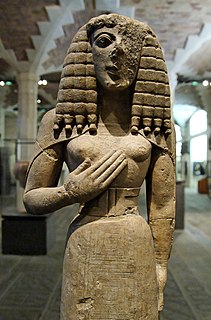 W
WAnax is an ancient Greek word for "tribal chief, lord, (military) leader". It is one of the two Greek titles traditionally translated as "king", the other being basileus, and is inherited from Mycenaean Greece, and is notably used in Homeric Greek, e.g. for Agamemnon. The feminine form is anassa, "queen".
 W
WAutokratōr is a Greek epithet applied to an individual who is unrestrained by superiors. It has been applied to military commanders-in-chief as well as Roman and Byzantine emperors as the translation of the Latin title imperator. Its connection with Byzantine-style absolutism gave rise to the modern terms autocrat and autocracy. In modern Greek, it means "emperor", and its feminine form is autokrateira.
 W
WBasileus is a Greek term and title that has signified various types of monarchs in history. In the English-speaking world it is perhaps most widely understood to mean "king" or "emperor". The title was used by sovereigns and other persons of authority in ancient Greece, the Byzantine emperors, and the kings of modern Greece.
 W
WThe Diadochi were the rival generals, families, and friends of Alexander the Great who fought for control over his empire after his death in 323 BCE. The Wars of the Diadochi mark the beginning of the Hellenistic period from the Mediterranean Sea to the Indus River Valley.
 W
WThe ephors were leaders of ancient Sparta, and its colonies of Taras and Heraclea, and shared power with the two Spartan kings. The ephors were a council of five elected annually who swore "on behalf of the city" while the kings swore for themselves.
 W
WThe Gerousia (γερουσία) was the Spartan council of elders, which was made up of men over the age of sixty. It was created by the semi-legendary Spartan lawgiver Lycurgus in the seventh century BC, in his Great Rhetra. According to Lycurgus' biographer Plutarch, the creation of the Gerousia was the first significant constitutional innovation instituted by Lycurgus.
 W
WHegemony is the political, economic, or military predominance or control of one state over others. In ancient Greece, hegemony denoted the politico-military dominance of a city-state over other city-states. The dominant state is known as the hegemon. In the 19th century, hegemony came to denote the "Social or cultural predominance or ascendancy; predominance by one group within a society or milieu". Later, it could be used to mean "a group or regime which exerts undue influence within a society". Also, it could be used for the geopolitical and the cultural predominance of one country over others, from which was derived hegemonism, as in the idea that the Great Powers meant to establish European hegemony over Africa, Asia and Latin America.
 W
WThe Companions were the elite cavalry of the Macedonian army from the time of king Philip II of Macedon, achieved their greatest prestige under Alexander the Great, and have been regarded as the first or among the first shock cavalry used in Europe. Chosen Companions, or Hetairoi, formed the elite guard of the king (Somatophylakes).
 W
WHippeis is a Greek term for cavalry. In ancient Athenian society, after the political reforms of Solon, the hippeus was the second highest of the four social classes. It was composed of men who had at least 300 medimnoi or their equivalent as yearly income. According to the Timocratic Constitution the average citizen had a yearly income of less than 200 medimnoi. This gave the men who made 300 medimnoi the ability to purchase and maintain a war horse during their service to the state.
 W
WHoplites were citizen-soldiers of Ancient Greek city-states who were primarily armed with spears and shields. Hoplite soldiers utilized the phalanx formation to be effective in war with fewer soldiers. The formation discouraged the soldiers from acting alone, for this would compromise the formation and minimize its strengths. The hoplites were primarily represented by free citizens – propertied farmers and artisans – who were able to afford a linen armour or a bronze armour suit and weapons. Most hoplites were not professional soldiers and often lacked sufficient military training. Some states maintained a small elite professional unit, known as the epilektoi ("chosen") since they were picked from the regular citizen infantry. These existed at times in Athens, Argos, Thebes, and Syracuse, among others. Hoplite soldiers made up the bulk of ancient Greek armies.
 W
WThe League of the Islanders or Nesiotic League was a federal league (koinon) of ancient Greek city-states encompassing the Cyclades islands in the Aegean Sea. Organized under the auspices of Antigonus Monophthalmus in c. 314/3 BC, it remained under Antigonid control until c. 287 BC. It then passed under the aegis of the Ptolemaic Kingdom until Ptolemaic control over the central Aegean collapsed and the League was dissolved sometime in the mid-3rd century BC. The Cycladic islands reverted to independence, except for a few that passed under Macedonian control. The league was re-established under the leadership of Rhodes in c. 200 BC, and survived until c. 167 BC.
 W
WA polemarch was a senior military title in various ancient Greek city states (poleis). The title is derived from the words polemos (war) and archon and translates as "warleader" or "warlord". The name indicates that the polemarch's original function was to command the army; presumably the office was created to take over this function from the king. Eventually military command was transferred to the strategoi (στρατηγοί), but the date and stages of the transfer are not clear.
 W
WPotnia is an Ancient Greek word for "Mistress, Lady" and a title of a goddess. The word was inherited by Classical Greek from Mycenean Greek with the same meaning and it was applied to several goddesses. A similar word is the title Despoina, "the mistress", which was given to the nameless chthonic goddess of the mysteries of Arcadian cult. She was later conflated with Kore (Persephone), "the maid", the goddess of the Eleusinian mysteries, in a life-death rebirth cycle which leads the neophyte from death into life and immortality. Karl Kerenyi identifies Kore with the nameless "Mistress of the labyrinth", who probably presided over the palace of Knossos in Minoan Crete.
 W
WProxeny or proxenia in ancient Greece was an arrangement whereby a citizen hosted foreign ambassadors at his own expense, in return for honorary titles from the state. The citizen was called proxenos or proxeinos (πρόξεινος). The proxeny decrees, which amount to letters patent and resolutions of appreciation were issued by one state to a citizen of another for service as proxenos, a kind of honorary consul looking after the interests of the other state's citizens. A cliché phrase is euergetes (benefactor) and proxenos.
 W
WThe Seven Sages or Seven Wise Men was the title given by classical Greek tradition to seven philosophers, statesmen, and law-givers of the 6th century BC who were renowned for their wisdom.
 W
WThe sibyls were oracles in Ancient Greece. The earliest sibyls, according to legend, prophesied at holy sites. Their prophecies were influenced by divine inspiration from a deity; originally at Delphi and Pessinos. In Late Antiquity, various writers attested to the existence of sibyls in Greece, Italy, the Levant, and Asia Minor.
 W
WSomatophylakes in its literal English translation from Greek, means "bodyguards."
 W
WStrategos or strategus, plural strategoi, is used in Greek to mean military general. In the Hellenistic world and the Byzantine Empire the term was also used to describe a military governor. In the modern Hellenic Army it is the highest officer rank.
 W
WAutokratōr is a Greek epithet applied to an individual who is unrestrained by superiors. It has been applied to military commanders-in-chief as well as Roman and Byzantine emperors as the translation of the Latin title imperator. Its connection with Byzantine-style absolutism gave rise to the modern terms autocrat and autocracy. In modern Greek, it means "emperor", and its feminine form is autokrateira.